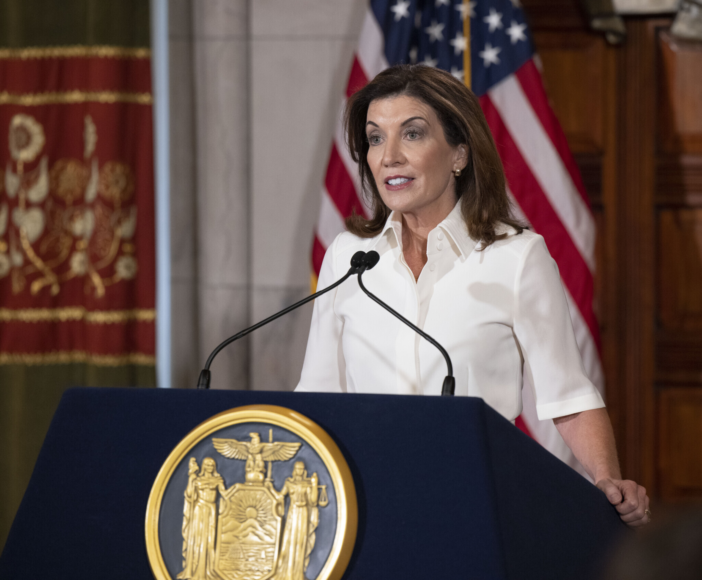Governor Once Again Rejects Bill to Expand New York Parents’ Chances for Contact With Their Adopted Children


BY ADILIA WATSON AND SUSANTI SARKAR
New York’s governor has rejected a bill that would have given biological parents greater opportunity to communicate with their children who’ve been adopted, further hampering years of activism and legislative efforts to maintain these family bonds.
In a veto letter addressed to state lawmakers, Gov. Kathy Hochul said “the decision to terminate parental rights is not undertaken lightly by the family court,” and in most cases, follows “prolonged efforts to reunite the child with the birth parent(s).” But when those efforts are ultimately unsuccessful, she added, “it is imperative that the child integrate into the adoptive home without continued interference by the court. Adoptive parents are in the best position to determine if and to what extent their child should continue to have contact with their birth parents.”
The Preserving Family Bonds Act, Hochul wrote, “would inappropriately substitute the judgment of adoptive parents with that of the court.”
Under current law, judges cannot order contact between children and their families of origin after an “involuntary termination” of parental rights. If a parent has voluntarily surrendered their legal rights, however, they can make an agreement with a pre-adoptive foster parent to remain connected.
Supporters of the Preserving Family Bonds Act, which passed the Legislature on June 21, described deep dismay over the veto, but vowed to keep pushing for the legislation to pass.
“I’m incredibly disappointed and frustrated that the governor can’t recognize what an important development it could be for children who are being adopted,” said Betsy Kramer, special litigation director at Lawyers for Children.
Kramer added that the legislation would have allowed the court to override the wishes of an adoptive parent in “very, very limited circumstances,” and would have been invaluable for “young people who are adopted and really struggling with wanting to have some contact with their biological parents.”
The Preserving Family Bonds Act sought to assist parents who did not voluntarily give up their rights to a child. Similar bills have been rejected by two governors — once by former Gov. Andrew Cuomo in 2019 and as of this week, twice by Gov. Hochul, who previously vetoed the legislation in 2021.
The latest version would have permitted any party involved in a case that concluded in an involuntary termination of parental rights to request a hearing, including a child, foster parent, pre-adoptive caregiver or a foster care agency representative. Judges would have had final say, deciding whether continued contact would be appropriate based on the child’s best interest. Under the legislation, the judge would also determine the suitable way to communicate, such as in-person visits, phone calls, letters or photo-sharing.
Authored by Rep. Latoya Joyner and Sen. Jabari Brisport, the bill differed from previous versions. It would have excluded contact in cases where family courts have ruled that a child was severely or repeatedly abused by the parent and would have required the consent of children over age 14.
The Adoptive and Foster Family Coalition of New York has been among the opponents of the Preserving Family Bonds Act, highlighting concerns related to adoptive parents’ authority. In a September letter sent to the governor, coalition leaders asked Hochul to veto the legislation and called it “flawed” for a number of reasons, including potential difficulty for adoptive parents who must relocate to pursue job opportunities.
“We support parental contact, but this bill is not the solution, and we are prepared to oppose it again,” the letter read.
But advocates for parents and children stressed the importance of maintaining not only emotional connections and the assurance of love, but also the ability to weigh in on important medical decisions.
Cassandra Gonzalez, a Bronx mother, activist and support coordinator at the parent advocacy group Rise, lost contact with her first-born son almost 10 years ago, after she voluntarily surrendered her rights, she said. At the time, she understood that it was the only way they would be able to keep in touch after he was adopted. But soon after, she said, the adoptive parents changed their minds.
When she learned about what the Preserving Family Bonds Act could do for families like hers, Gonzalez joined a group of impacted parent activists who lobbied for the bill’s passage. In an interview, she expressed the pain she felt at not being able to visit or even communicate with her son, now almost a teenager.
“Even if the visits are monitored, why shouldn’t I be able to see him?” Gonzalez said. “Why can’t there be more love?”
Nila Natarajan, a supervising attorney with Brooklyn Defender Services, said the sudden cut-off — after years of continuous relationship-building in the child welfare system that may involve weekly visits, and participation in educational and health decisions — can be “devastating for the parent and the child.”
Without some way of communicating, “it becomes about the relationships between adults, rather than the children,” Natarajan said.
Black and Indigenous parents are most at risk of having their parental rights terminated, reflecting this nation’s deep history of racism and forced family separation. That context cannot be overlooked in the child welfare system, say supporters of the Preserving Family Bonds Act.
“Those families and those children are longing to reunite, to reconnect and to have a fresh start at continuing a journey that was brutally interrupted by child welfare. How can we deny them that opportunity?” said Jeremy Kohomban, president and CEO of The Children’s Village and an adoptive parent. “When you don’t have the history and the connection, those conversations cannot happen. We all want to know where we come from. We want to know who loved us.”
Newsletter Sign up
Receive weekly updates from The Imprint.
The latest version of the legislation seeking to maintain parental bonds had some noteworthy supporters. And some were hopeful after what they described as fruitful conversations with the governor’s office, and a number of concessions that were agreed upon. But attorney Kramer said ultimately, the appeals did not seem to move the governor.
Jess Dannhauser, commissioner of New York City’s Administration for Children’s Services, expressed his disappointment in a statement to The Imprint.
“We believe the most recent version of the legislation got it right by creating greater opportunity for an ongoing relationship for children and parents, while incorporating important protections for adoptive families,” Dannhauser said. “We hope this Act will be signed into law at the next session.”

